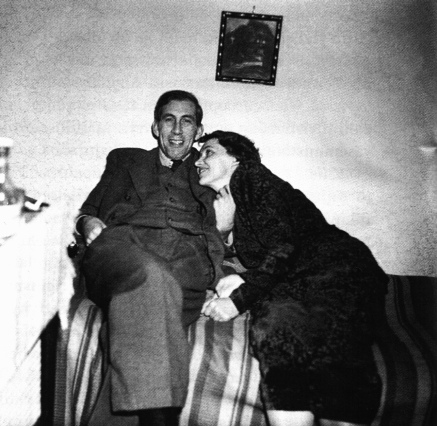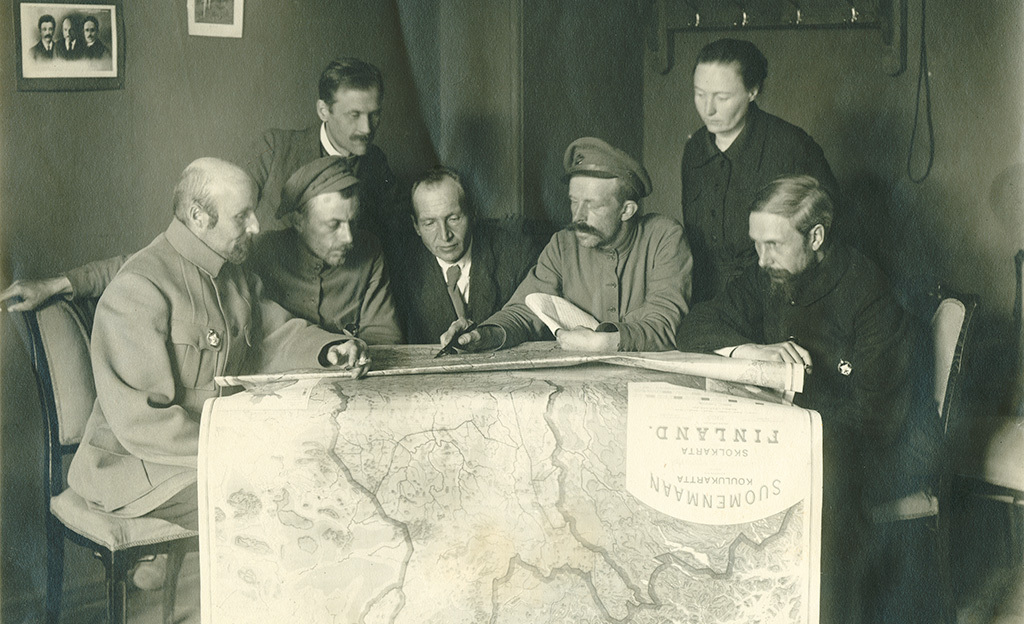|
Elvi Sinervo
Elvi Aulikki Sinervo (4 May 1912, Helsinki – 28 August 1986 Helsinki) was a Finnish writer, poet, and translator. She was the recipient of the Eino Leino Prize in 1980. She married member of parliament Mauri Ryömä (1911–58). Their daughter is translator Liisa Ryömä. Works Sinervo's first work ''Runo Söörnäisistä'' ("A Poem about Söörnäinen", 1937) is a collection of short stories about working-class life in Helsinki. Her next work, ''Palavankylän seppä'' ("The Smith of Palavankylä", 1939) is a novel about Hermanni Rintaluoma, a man who comes back to the country after the Civil War and tries to begin a new life amongst hatred and suspicion. Her another collection of short stories, ''Vuorelle nousu'' (A Climb to the Mountain, 1948) is about the experiences related to the underground Communist movement in the country. Her other significant works include her novels ''Viljami Vaihdokas'' ("Viljami the Changeling", 1946) and ''Toveri, älä petä'' ("Comrade, D ... [...More Info...] [...Related Items...] OR: [Wikipedia] [Google] [Baidu] |
Helsinki
Helsinki ( or ; ; sv, Helsingfors, ) is the Capital city, capital, primate city, primate, and List of cities and towns in Finland, most populous city of Finland. Located on the shore of the Gulf of Finland, it is the seat of the region of Uusimaa in southern Finland, and has a population of . The Helsinki urban area, city's urban area has a population of , making it by far the List of urban areas in Finland by population, most populous urban area in Finland as well as the country's most important center for politics, education, finance, culture, and research; while Tampere in the Pirkanmaa region, located to the north from Helsinki, is the second largest urban area in Finland. Helsinki is located north of Tallinn, Estonia, east of Stockholm, Sweden, and west of Saint Petersburg, Russia. It has History of Helsinki, close historical ties with these three cities. Together with the cities of Espoo, Vantaa, and Kauniainen (and surrounding commuter towns, including the eastern ... [...More Info...] [...Related Items...] OR: [Wikipedia] [Google] [Baidu] |
Finland
Finland ( fi, Suomi ; sv, Finland ), officially the Republic of Finland (; ), is a Nordic country in Northern Europe. It shares land borders with Sweden to the northwest, Norway to the north, and Russia to the east, with the Gulf of Bothnia to the west and the Gulf of Finland across Estonia to the south. Finland covers an area of with a population of 5.6 million. Helsinki is the capital and largest city, forming a larger metropolitan area with the neighbouring cities of Espoo, Kauniainen, and Vantaa. The vast majority of the population are ethnic Finns. Finnish, alongside Swedish, are the official languages. Swedish is the native language of 5.2% of the population. Finland's climate varies from humid continental in the south to the boreal in the north. The land cover is primarily a boreal forest biome, with more than 180,000 recorded lakes. Finland was first inhabited around 9000 BC after the Last Glacial Period. The Stone Age introduced several different ... [...More Info...] [...Related Items...] OR: [Wikipedia] [Google] [Baidu] |
Eino Leino Prize
The Eino Leino Prize is an annual prize award to top writers in Finland since 1956, with particular emphasis on poets. It is named after Eino Leino, a pioneer of Finnish poetry. Recipients *1956 Viljo Kajava *1957 Helvi Juvonen *1958 Rabbe Enckell *1959 Aapeli (Simo Puupponen) *1960 Olavi Paavolainen *1961 Juha Mannerkorpi *1962 Pertti Nieminen *1963 Paavo Haavikko *1964 Arvo Salo *1965 Hagar Olsson *1966 Einari Vuorela *1967 Marja-Leena Mikkola *1968 Kerttu Kauniskangas *1969 Mirjam Polkunen *1970 Heikki Palmu *1971 Vilhelm Helander and Mikael Sundman *1972 Raoul Palmgren *1973 Arvo Turtiainen *1974 Kaisa Korhonen *1975 Henrik Tikkanen *1976 Eila Kivikk'aho *1977 Nils-Börje Stormbom *1978 Jukka Vieno *1979 Mirkka Rekola *1980 Elvi Sinervo *1981 Väinö Kirstinä *1982 Hannu Mäkelä *1983 Pentti Linkola *1984 Erno Paasilinna *1985 Hannu Salama *1986 Claes Andersson *1987 Helvi Hämäläinen *1988 Jyrki Pellinen *1989 Tuomas Anhava *1990 Olli Jalonen *1991 ... [...More Info...] [...Related Items...] OR: [Wikipedia] [Google] [Baidu] |
Mauri Ryömä
Mauri Ryömä (30 October 1911, Helsinki – 28 November 1958) was a Finnish physician and politician. Biography He was a member of the Parliament of Finland, representing the Social Democratic Party of Finland (SDP) from 1936 to 1937 and the Finnish People's Democratic League (SKDL) from 1945 until his death in 1958. He was imprisoned for political reasons from 1940 to 1944. After he was freed in 1944 as a result of the Moscow Armistice of 19 September 1944, he joined the SKDL and the Communist Party of Finland (SKP). He was the son of Hannes Ryömä and he was married to Elvi Sinervo. He died in a car accident four months after having been reelected in the 1958 Finnish parliamentary election Parliamentary elections were held in Finland on 6 and 7 July 1958. Nohlen, D & Stöver, P (2010) ''Elections in Europe: A data handbook'', p606 The communist Finnish People's Democratic League emerged as the largest party, but was unable to form .... References Sources * Hanski, J ... [...More Info...] [...Related Items...] OR: [Wikipedia] [Google] [Baidu] |
Liisa Ryömä
Liisa is a Finnish and Estonian female given name. Its name day is 19 November in both countries. It originated as a variation of the name Lisa or Alisa. As of January 2013, there are more than 100,000 women registered in Finland with this name. It is listed by the Finnish Population Register Centre as one of the top 10 most popular female given names ever. As of 1 January 2020, 1,114 women in Estonia have the first name Liisa, making it the 169th most popular female name in the country. The name is most commonly found in Saare County. Notable people Some notable people who have this name include: * Liisa Aibel (born 1972), Estonian actress * Liisa Anttila (born 1974), Finnish orienteer * Liisa Ehrberg (born 1988), Estonian cyclist * Liisa Hyssälä (born 1948), Finnish politician * Liisa Jaakonsaari (born 1945), Finnish politician * Liisa Kauppinen (born 1939), Finnish human rights activist * Liisa Laurila (born 1974), Finnish swimmer * Liisa Lilleste (born 1985), Estonian f ... [...More Info...] [...Related Items...] OR: [Wikipedia] [Google] [Baidu] |
Finnish Civil War
The Finnish Civil War; . Other designations: Brethren War, Citizen War, Class War, Freedom War, Red Rebellion and Revolution, . According to 1,005 interviews done by the newspaper '' Aamulehti'', the most popular names were as follows: Civil War 29%, Citizen War 25%, Class War 13%, Freedom War 11%, Red Rebellion 5%, Revolution 1%, other name 2% and no answer 14%, was a civil war in Finland in 1918 fought for the leadership and control of the country between White Finland and the Finnish Socialist Workers' Republic (Red Finland) during the country's transition from a grand duchy of the Russian Empire to an independent state. The clashes took place in the context of the national, political, and social turmoil caused by World War I ( Eastern Front) in Europe. The war was fought between the "Reds", led by a section of the Social Democratic Party, and the "Whites", conducted by the conservative-based senate and the German Imperial Army. The paramilitary Red Guards, which ... [...More Info...] [...Related Items...] OR: [Wikipedia] [Google] [Baidu] |
Communist Party Of Finland
The Communist Party of Finland ( fi, Suomen Kommunistinen Puolue, SKP; sv, Finlands Kommunistiska Parti) was a communist political party in Finland. The SKP was a section of Comintern and illegal in Finland until 1944. The SKP was banned by the state from its founding and did not participate in any elections with its own name. Instead, front organisations were used. In the 1920s the communists took part in the Socialist Workers' Party of Finland (1920–1923) and the Socialist Electoral Organisation of Workers and Smallholders (1924–1930). Both of them were also banned. In 1944, a new front, Finnish People's Democratic League was formed. The SKP controlled these fronts but they always had a prominent minority of non-communist socialists. History Early stages In 1918, the Reds lost the Finnish Civil War. The Social Democratic Party of Finland had supported the losing side, and several of its leaders were exiled in Soviet Russia. Some of these exiles founded the Communis ... [...More Info...] [...Related Items...] OR: [Wikipedia] [Google] [Baidu] |
State Anthem Of The Soviet Union
The "State Anthem of the Soviet Union" was the national anthem of the Soviet Union and the regional anthem of the Russian Soviet Federative Socialist Republic from 1944 to 1991, replacing "The Internationale". Its original lyrics were written by Sergey Mikhalkov (1913–2009) in collaboration with Gabriyel’ Arkadyevich Ureklyan (1899–1945), and its music was composed by Alexander Alexandrov (1883–1946). For a two-decade interval following de-Stalinization, the anthem was performed without lyrics. The second set of lyrics, also written by Mikhalkov and in which Stalin's name was omitted, was adopted in 1977. A decade after the collapse of the Soviet Union, the music was adopted with new lyrics as the Russian national anthem. History Origins The anthem's music was originally composed by Alexander Alexandrov in 1938 for the Hymn of the Bolshevik Party. Its opening bars were borrowed from one of Alexandrov's previous pieces, " Life has become better", which was base ... [...More Info...] [...Related Items...] OR: [Wikipedia] [Google] [Baidu] |
1912 Births
Year 191 ( CXCI) was a common year starting on Friday (link will display the full calendar) of the Julian calendar. At the time, it was known as the Year of the Consulship of Apronianus and Bradua (or, less frequently, year 944 ''Ab urbe condita''). The denomination 191 for this year has been used since the early medieval period, when the Anno Domini calendar era became the prevalent method in Europe for naming years. Events By place Parthia * King Vologases IV of Parthia dies after a 44-year reign, and is succeeded by his son Vologases V. China * A coalition of Chinese warlords from the east of Hangu Pass launches a punitive campaign against the warlord Dong Zhuo, who seized control of the central government in 189, and held the figurehead Emperor Xian hostage. After suffering some defeats against the coalition forces, Dong Zhuo forcefully relocates the imperial capital from Luoyang to Chang'an. Before leaving, Dong Zhuo orders his troops to loot the tombs o ... [...More Info...] [...Related Items...] OR: [Wikipedia] [Google] [Baidu] |
1986 Deaths
The year 1986 was designated as the International Year of Peace by the United Nations. Events January * January 1 **Aruba gains increased autonomy from the Netherlands by separating from the Netherlands Antilles. **Spain and Portugal enter the European Community, which becomes the European Union in 1993. *January 11 – The Sir Leo Hielscher Bridges, Gateway Bridge in Brisbane, Australia, at this time the world's longest prestressed concrete free-cantilever bridge, is opened. *January 13–January 24, 24 – South Yemen Civil War. *January 20 – The United Kingdom and France announce plans to construct the Channel Tunnel. *January 24 – The Voyager 2 space probe makes its first encounter with Uranus. *January 25 – Yoweri Museveni's National Resistance Army Rebel group takes over Uganda after leading a five-year guerrilla war in which up to half a million people are believed to have been killed. They will later use January 26 as the official date to avoid a coincidence of ... [...More Info...] [...Related Items...] OR: [Wikipedia] [Google] [Baidu] |



.jpg)
